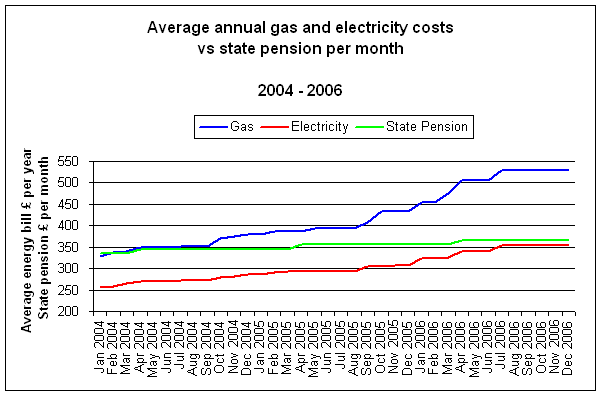
The announcement by British Gas in February that it was putting up its prices by 22% across the board surprised everyone. The amount of the rise, especially for electricity, was way above the increases announced by its competitors and put the UK’s biggest gas supplier well at the top of the price table. It also offered to let people lock into these record prices until 2009. But that might be a bad idea.
Jan Malinowski is the founder of www.theenergyshop.com and a keen analyst of fuel prices. He does not expect British Gas to raise its prices again – or at all.
"I think British Gas has done it all in one go and it is now offering to lock people into that higher rate with its ‘no rises until 2009’ product. But if you look at the forward price curve for energy it is trending down rather than up. The first quarter of 2008 [the price at which companies buy their 2007 gas] is about 10 per cent lower. Of course there may be world political changes, oil shocks, that we can’t predict. But I expect falls rather than rises. British Gas’s electricity price in particular may have to come down just to keep customers."

As the graph shows, by the end of this year the retail price of gas will have risen by 61% in three years and electricity will be up 38%. That means energy bills up by almost £6 a week, hitting those on fixed incomes particularly hard. Over three years the cost of heating the average home will have risen from seven and a half weeks’ pension to 10 and half. In other words, more than a fifth of the state pension is needed just to keep warm.
If you have not already switched supplier that can save you a lot. If you still buy your gas from British Gas or your electricity from your local supplier then switching could save you £200 a year. Even if you have switched before, changing again could make sure you have the lowest cost supplier. The cheapest deals are on the internet. Even British Gas offers Clickenergy which is £232 a year cheaper on average than its normal tariff – though beware the premium rate customer service line. Fierce competition has pushed five small suppliers out of business. That can mean losing any surplus on your direct debit payments. But your supply is safe – that will be taken over by one of the big companies.
More: www.energywatch.org.uk
TURKMENS LOSE PENSIONS
We might complain about low pensions in the UK but spare a thought for more
than 100,000 pensioners in Turkmenistan. The Government has just stopped their
pensions. The remaining 230,000 have had the amount paid cut by about a sixth.
Retirement age in the small ex-Soviet country on the Caspian Sea is 62 for men
and 57 for women and , though life expectancy is about five years less than
these ages. The average pension was £25 a month in the cities falling to as
little as £6 in the rural areas. But Saparmurad Niyazov, the 66-year-old
President-for-life of this oil rich state, says the Government can no longer
afford them. Men who cannot prove at least 25 years work and women with less
than 20 will now get no pension at all – a measure said to discriminate against
Russian nationals still living in the country. Pensioners are reported to be
begging or selling their possessions in markets to try to survive. Their only
consolation is that gas and electricity remain free. And that, as we know, is
worth a lot of money.
WATCH THE PRICE
|
No-one need ever be without the right time. But even though you can buy a watch that is accurate to a few seconds a month for £10, older mechanical watches are rising steadily in price. ‘Mechanical’ does not just mean that the hands go round. It also means the time is measured by a clockwork mechanism rather than a quartz crystal. The most bankable watch is probably the best known brand – Rolex. Almost anything sells and if it is more than a few years old may well be worth far more than you paid for it. Paul Maudsley is head of watches at London auctioneer Bonhams which holds six watch sales a year. He says prices are rising strongly. "A lot of people come in with Rolexes from the 1940s or 50s and some are very valuable. A gent last year called with a Rolex he had paid £140 for in 1972. To him just a stainless steel watch he wore daily. We sold it for £9000. OK it was rare and a collector wanted it. But in our next sale we have a selection of Rolexes from the 40s to the 60s which will sell for £1000 to £1500."
|
|
 |
He says that any mechanical watch with some age on it will
sell. Known brands are good – such as Patek Philippe, Vacheron Constantin,
Longines. And there is always added value for those that do more than just
tell the time, such as ‘reading out’ the time to you in bells, so called
repeaters. "The more functions the more money. A quarter repeater is worth more than a plain watch, a minute repeater more still, moon phases more again. And so on." Last November Bonhams sold a rare white gold wristwatch with perpetual calendar, moon phase and split-second chronograph for £72,000 [illus ordered]. But that was well short of the world record price fetched by another Patek Philippe model from 1939 sold in 2002 for more than £2 million |
LIVING TOGETHER
For the first time people who live together are to get similar rights to
property and maintenance as married couples.
The new rights, expected to start around the middle of the year, will apply only in Scotland after its Parliament passed new laws to give ‘cohabitants’ equal rights to goods acquired during the time they lived together. Any money used for their joint household expenses or anything acquired with that money will belong to both equally. That does not extend to the home they live in, though it could apply to a second home acquired while they lived together. When a cohabitation ends the courts can order one party to pay to the other a capital sum to reflect their ‘share’ of the joint property. Where the couple have a child then one partner can be ordered to pay maintenance to the other to support it. The new law also gives a cohabitant the right to inherit where their partner dies without making a will; the courts will decide how much they get.
However, cohabitants will not get the same rights as married couples or civil partners when it comes to inheritance tax. That would require a change in the laws affecting the whole of the UK by the Parliament in London. However, the Law Commission in England and Wales is considering the position of long-term cohabiting couples and is expected to report shortly on extending some of the rights of married couples to them.
Fending off the Fraudsters
Nearly six out of ten people aged 45 to 54 have been targeted by a scam in
the last year. Among the over 65s the figure is four out of ten. So no surprise
that the Office of Fair Trading is in the middle of a major campaign to bust the
scammers. Emails, phone calls, or even good old fashioned letters can all be
used by crooks to try to part us from our money. And some can be very upsetting.
One Saga reader was distressed by letters prophesying that she would face
trouble with her friends if she did not send money to a psychic to intervene
with ‘evil forces’. She wrote to me "Common-sense tells me to laugh it off but
it has left me feeling quite shaken".
As with all scams the best thing to do is to destroy such letters. Do not return them – as this lady did. That just encourages them to send more. Tear them up and forget them. They are lies by thieves.
Some scams target your bank account directly. Emails claiming to be from your bank – and looking very real – tell you to ‘resend’ your personal details and passwords by clicking on a link. If you do that you could find your bank account cleared out. Others tell you that you have won a lottery – but you must send some money to ‘release’ the prize. Individuals – often widows – in South American or African countries ask your help to get a large amount of money out of the country in exchange for a share. Once you have bitten on the bait, they will start asking you for money for ‘legal fees’ or ‘sweeteners’ for customs officers or bank officials. Another common scam offers an investment in a scheme which will ‘guarantee’ big returns. Needless to say, any money you send will be stolen and you will get nothing.
The OFT has published a Guide to Scam-busting which you can get free from 0800 389 3159 or www.oft.gov.uk.
You can stop junk mail by registering with the Mailing Preference Services on 0845 703 4599 or through www.mpsonline.org.uk. A similar service stops phone calls on and 0845 070 0707 or www.tpsonline.org.uk. Those services may not stop calls or letters from outside the UK. The best weapon against these conmen is the waste paper bin – or if it is a phone call, just hang up.
April 2006